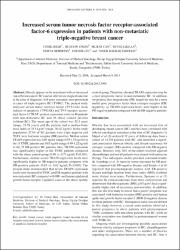Increased serum tumor necrosis factor receptor-associated factor-6 expression in patients with non-metastatic triple-negative breast cancer

Göster/
Erişim
info:eu-repo/semantics/openAccessTarih
2015Yazar
Bilir, CemilEngin, Hüseyin
Can, Murat
Likhan, Sevili
Demirtaş, Derya
Kuzu, Fatih
Bayraktaroğlu, Taner
Üst veri
Tüm öğe kaydını gösterKünye
Bilir, C., Engin, H., Can, M., Likhan, S., Demirtas, D., Kuzu, F., & Bayraktaroglu, T. (2015). Increased serum tumor necrosis factor receptor-associated factor-6 expression in patients with non-metastatic triple-negative breast cancer. Oncology Letters, 9, 2819-2824. https://doi.org/10.3892/ol.2015.3094Özet
Obesity appears to be associated with an increased risk of breast cancer (BC) and an inferior oncological outcome at the time of diagnosis, with poor outcomes most prominent in cases of triple-negative BC (TNBC). the present study analyzed serum tumor necrosis factor (TNF)-like weak inducer of apoptosis (TWEAK) and TNF receptor associated factor-6 (TRAF) protein expression levels in 48 patients with non-metastatic BC and 26 obese control patients (without BC). the mean age of the cohort was 52.5 years (range, 35-78 years) and the patients had a median body mass index of 33.5 kg/m(2) (range, 30-47 kg/m(2)). in the study population, 27.1% of BC patients were triple negative and 70.8% were hormone receptor (HR)-positive. Median serum TRAF6 expression was 0.90 ng/ml (range, 0.55-1.53 ng/ml) in the 13 TNBC patients and 0.63 ng/ml (range, 0.49-1.22 ng/ml) in the 35 HR-positive BC patients; thus, TRAF6 expression was significantly higher in the TNBC patients compared with the obese control group (0.90 vs. 0.73 ng/ml; P=0.033). Furthermore, median serum TRAF6 expression levels were significantly higher in HR-negative patients compared with HR-positive patients (0.83 vs. 0.62 ng/ml; P=0.002). the present study demonstrated that serum TRAF6 expression levels were increased in TNBC and HR-negative patients with non-metastatic BC compared with HR- and human epidermal growth factor receptor 2-positive cases or the obese healthy control group. Therefore, elevated TRAF6 expression may be a poor prognostic factor in non-metastatic BC. in addition, we propose that progesterone (PR) negativity may be a more useful poor prognosis factor than estrogen receptor (ER) negativity, as TRAF6 expression levels were higher in the PR-negative patients compared with the ER-negative patients.
Kaynak
Oncology LettersCilt
9Sayı
6Koleksiyonlar
İlgili Öğeler
Başlık, yazar, küratör ve konuya göre gösterilen ilgili öğeler.
-
Efficiency of radiation-free retrograde intrarenal surgery (RIRS) in children and evaluation of factors affecting surgical success [Eficiencia de la cirugía intrarenal retrograda sin radiación en niños y evaluación de los factores que afectan el éxito quirúrgico]
Bulut, E.C.; Yeşil, S.; Çetin, S.; Koparal, M.Y.; Polat, F.; Karabulut, R.; Ünsal, A. (NLM (Medline), 2020)OBJECTIVE: To investigate the factors affecting surgical success rates and duration of operation in retrograde intrarenal surgery (RIRS) without fluoroscopy in children. The aim of the study was to demonstrate the efficacy ... -
Comparing the automatic item selection procedure and exploratory factor analysis in determining factor structure
Avşar, Asiye Şengül (2022)It is necessary to supply proof regarding the construct validity of the scales. Especially, when new scales are developed the construct validity is researched by the Exploratory Factor Analysis (EFA). Generally, factor ... -
Usefullness of serum insulin-like growth factor (IGF-1) and insulin-like growth factor binding protein-3 (IGFBP-3) for colorectal cancer diagnosis
İnsülin benzeri büyüme faktörü-1 (IGF-1), etkisi insülin benzeri büyüme faktör bağlayıcı protein-3 (IGFBP-3) tarafından düzenlenen, potent bir mitojen ve antiapoptotik ajandır. IGFBP-3, IGF-1’i dolaşımda taşır, hedef ...

















